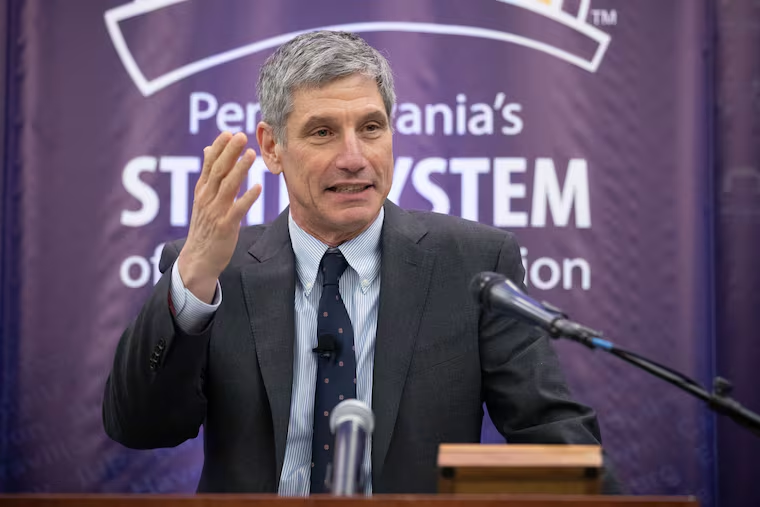Pennsylvania state universities freeze tuition, plan for uncertain fall
State system chancellor Daniel Greenstein worries that colleges with fewer resources and the students they serve will fare worse in a post-pandemic world.

Students at Pennsylvania’s 14 state universities can count on tuition remaining the same next year, but just what their fall semester looks like is uncertain.
And Daniel Greenstein, chancellor of the Pennsylvania State System of Higher Education, worries that a post-pandemic world will only further exacerbate inequalities between better-resourced colleges and poorer ones and the students they serve: Universities could be competing for masks, swabs, and other resources that would allow them to safely open. The state system has been strapped for cash for years with enrollment declining by about 20% since 2010.
“This is a Darwinian model that’s being introduced here at the federal and state levels across the country, where, basically we’re saying, industries, organizations that can figure out how to make their customers and employees feel safe are going to thrive in the new economy, and the rest will go by the wayside,” Greenstein said in an interview before the board of governors voted Wednesday to freeze tuition. “What really disturbs me is that those who have the means can compete better than those who don’t. And those who do not have the means also enroll in enormous disproportion low-income students, students of color, and rural students.”
Greenstein shared his concerns with the board, which voted to freeze tuition and the technology fee for next year — and tentatively plan for a 1% increase in 2021-22 — to help struggling families. In-state students, who make up nearly 90% of the system’s students, will pay $7,716 in tuition and $478 in fees. It’s the second consecutive year of a tuition freeze and follows announcements by Temple, Pennsylvania State University, Rutgers, and Delaware Valley that they planned to freeze tuition, too.
» READ MORE: Pa. state universities freeze tuition for first time in more than 20 years
Greenstein also told the board the system anticipates a $52 million hole in revenue through the summer, due to the virus. Initial projections called for a $100 million shortfall, but the system’s universities are receiving nearly $80 million in federal stimulus dollars, about half of which can be used to offset losses, such as student refunds in room and board.
Greenstein said the system already was focused on saving money through shared services and educational programming — about $250 million over five years — and will have to accelerate that plan.
“We will have to figure out how to do in two or three what we were going to do in five,” he said.
» READ MORE: Area universities move to freeze 2020-21 tuition, given impact of the coronavirus
Much remains unknown about the fall, including how many students will enroll and whether campuses could reopen for in-person classes or if students will feel safe staying in dorms. It could be good news for system schools: More students may opt for state universities with lower tuition and those that are closer to their homes. he said.
“You can’t predict human behaviors,” he said.
Universities will have to consider whether to allow certain groups of students to return, such as graduating seniors or those taking labs or those serving internships and which faculty to bring back on campus and how to structure dorm living, he said.
“Very little is off the table,” he said in terms of options.
Decisions about the fall likely will be made by each campus, rather than across the system, because the 14 universities are spread across the state, from rural areas to cities, and face different circumstances. They are Bloomsburg, Clarion, Cheyney, California, East Stroudsburg, Edinboro, Indiana, Kutztown, Mansfield, Millersville, Lock Haven, Slippery Rock, Shippensburg, and West Chester.
He expects decisions to be made in the next four or five weeks.
Many of the universities in the system are struggling as a result of the virus, with nine anticipating they will have to dip into their reserves to cover $146 million in operating costs through 2023-24. The board on Wednesday approved up to a $6 million loan to Mansfield from the system, similar to loans that Cheyney has received in the past. Mansfield must provide an updated sustainability plan by June 19 to receive the money.
Greenstein questioned whether universities should be making their decisions or setting certain standards collectively, by region or as part of a group of states, similar to governors in contiguous states are working together to reopen.
Colleges will face enormous political and economic pressures about whether to open, especially considering schools are a major employer in many communities, he said.
“I would hate to be in a situation where through our competition we see decisions that are made that have serious deleterious impacts on the health or economic productivity of the community,” he said. “And in a Darwinian model, and we appear to be in one, there’s a significant risk of that.”